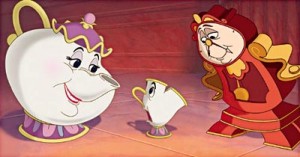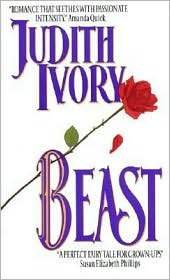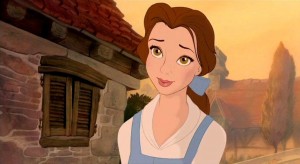 One of my favorite tropes is decidedly unwonky – one might even say a tale as old as time. Romance is full of re-interpretations of the Beauty and the Beast trope… why? Probably most compelling is that the couple must look past the surface, and isn’t that what falling in love is about? Mmm, the animalistic side of man has a certain carnal appeal, I must admit.
One of my favorite tropes is decidedly unwonky – one might even say a tale as old as time. Romance is full of re-interpretations of the Beauty and the Beast trope… why? Probably most compelling is that the couple must look past the surface, and isn’t that what falling in love is about? Mmm, the animalistic side of man has a certain carnal appeal, I must admit.
But even if it’s a great story, why read it over and over again? Speaking more broadly, why is it that we re-visit a certain trope, why are we drawn to them? Looking at sales charts, it’s not just me – tropes sell.
Recently I read Judith Ivory’s Beast. God, that woman. Judith Ivory has the most beautiful usage of language I have ever read… in fact, her books drink the words from the air, so that I am left without any, dumb-founded, in awe. But that’s not what I’m supposed to be talking about!
 So I’m reading this book, and the hero has a problematic eye and a slight limp, which should be the extent of his beastliness. But it’s not, because the worst thing about him is really his excessive pride. In his appearance, of all things! He hates things that are beautiful even while he is unerringly drawn to them.
So I’m reading this book, and the hero has a problematic eye and a slight limp, which should be the extent of his beastliness. But it’s not, because the worst thing about him is really his excessive pride. In his appearance, of all things! He hates things that are beautiful even while he is unerringly drawn to them.
The heroine is, of course, very beautiful. So insanely gorgeous she has been fawned over and sought out her entire life. I really loved that she was vain about her appearance. It seems inevitable, no? More realistic than modesty, if she truly is so beautiful.
The heroine uses a French phrase to describe the hero. It means ugly/beautiful, something that is not conventionally pretty but undeniably attractive. I believe it is jolie laide though I’m not sure if that refers only to women and there is a male form? Anyway, because the hero is kind of sinister looking on the outside but a good guy on the inside, he is the Beast. In the Disney incarnation of this story, and in many others that I have read, that’s it.
 Here? Not quite. The heroine, most people love her on sight. Très belle! But she is…. rather…. sometimes… well, she’s beastly! She is vapid, she recognizes her own vapidity and wishes, in a mostly passive sort of way, to be more. She is vain and selfish and occasionally manipulative, and she recognizes all this, feels mildly mournful, and then goes about her business. And I don’t mean to imply that she was a unsympathetic heroine, because she wasn’t. Despite being shown each unattractive quality in her person, I really liked her. I was rooting for her. (Jolie laide comes to mind.)
Here? Not quite. The heroine, most people love her on sight. Très belle! But she is…. rather…. sometimes… well, she’s beastly! She is vapid, she recognizes her own vapidity and wishes, in a mostly passive sort of way, to be more. She is vain and selfish and occasionally manipulative, and she recognizes all this, feels mildly mournful, and then goes about her business. And I don’t mean to imply that she was a unsympathetic heroine, because she wasn’t. Despite being shown each unattractive quality in her person, I really liked her. I was rooting for her. (Jolie laide comes to mind.)
It was the hero who hated the heroine on sight, for her beauty. He was the one who looked past her appearance to what was inside, and on finding it somewhat lacking in the traditional sense, was compelled to love her anyway. Well, she did the same for him, so it wasn’t precisely a role reversal… maybe a reciprocation.
As for why I read yet another interpretation of Beauty and the Beast… well, I would probably read the phone book if Judith Ivory were writing it. Do you need a new roof? the ad would say. As much as anyone needs security. Hardy, robust, resistant to undue leakage: these are the qualities we tender at A+ Roofing. And that is just the carpenters; wait until we tell you about our roofs.
But why did I go back for one more interpretation of the old trope? Why will I go back again? Was the mantle clock Cogsworth the father of Chip?
I don’t know. I just I don’t know.






















In general I am a humongous fan of retold stories of all varieties, but particularly the fairy-tale type. My husband and I have talked about this a bunch — we both have a huge amount of admiration for taking a particular form (whether it’s a poetic form, blues form in music, or an existing story) and managing to do something new and creative with it. Which I guess is to say that when retelling is done well, it’s particularly thrilling because someone has worked within a potentially tired old narrow rut and STILL managed to be brilliant. On the other hand, it can be a colossal disaster, too, for the same reason. :-) Anyway, I totally understand being drawn to the same story over and over again.
Ah, Judith Ivory. She’s such an amazing writer. I haven’t read Beast yet, but I’ll have to, now. (I’m still getting to the last books you rec’d — Anna Cowan and I are both agog over The Only Gold.)
I tend to think of tropes as engines for conflict, and the tried-and-true ones are really reliable at producing a sort of conflict that is delicious to watch. Marriages of convenience, for example, pretty much guarantee a wonderful combination of sexual tension, sexual promise, and emotional missed signals. I LOVE THEM. When it comes to a fairy tale plot, maybe it’s the same thing?
It can be fun to read someone elses interpretation of an old tale. But it still has to be done well. Good writing. Good story. Etc. Sometimes, you forget it is supposed to be a rewrite of an old story when its done so well. Sometimes, it is too much of a copy or just not a good story.